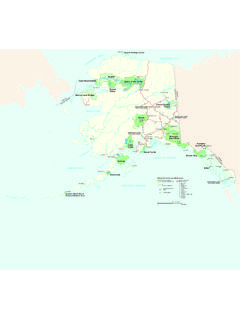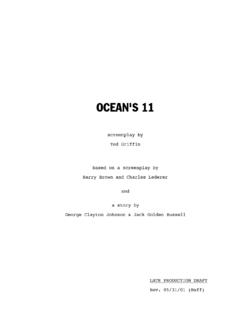Transcription of Ocean Literacy - coexploration.org
1 Ocean Literacy The Essential Principles and Fundamental Concepts of Ocean Sciences for Learners of All Ages Version 2 : March 2013. Composite photo features species from multiple Ocean basins and Island of Ofu in American Samoa What is Ocean Literacy ? O cean Literacy is an understanding of the Ocean 's influence on you and your influence on the Ocean . An Ocean -literate person: understands the Essential Principles and Fundamental Concepts about the Ocean ;. can communicate about the Ocean in a meaningful way; and Ocean Literacy : is able to make informed and responsible decisions regarding the Ocean and its resources. an This definition, the Essential Principles, and supporting Fundamental Concepts were developed through a community-wide consensus-building process. This effort built on previous work to define Ocean Literacy , assess what the public knows about the Ocean , and redress understanding the lack of Ocean -related content in state and national science education standards, instructional materials, and assessments.
2 The Essential Principles and Fundamental of the Concepts outlined in this guide (inside) represent content that does not always fall neatly within particular disciplines. As a result, many Fundamental Concepts illustrate more than one Essential Principle. Ocean 's influence For example, Essential Principle 4 lists only three Fundamental Concepts; however, several others could be listed as well. This demonstrates the interdisciplinary nature of Ocean sciences. Educators can use these Fundamental Concepts to fulfill and go beyond the on you and Next Generation Science Standards. They provide coordination, consistency, and coherence for Ocean sciences education and are transforming the vision of Ocean Literacy into reality. your influence Join Us The Ocean Literacy Campaign is an ongoing process. We encourage you to join in this open, participative on the Ocean process by signing up at to be kept informed; following us on Twitter @4oceanliteracy and Facebook at.
3 And joining the National Marine Educators Association ( ). Light passes through clouds like a spotlight off the California coast near Big Sur. Photo: Steve Lonhart/NOAA Monterey Bay National Marine Sanctuary The Ocean is the defining feature on our blue planet. Five great, interconnected Ocean basins, the Atlantic, Pacific, Indian, Arctic and Southern, make up the only Ocean in our solar system, and contain 97 percent of Earth's water. The vapor released into the atmosphere returns as rain, sleet and snow, ever replenishing the planet with UNderstanding freshwater. All life, including our own, exists because of the Ocean . Our lives depend, now and forever, on the health of the Ocean . Understanding the Ocean is essential to comprehending and protecting this planet on which we live. the Ocean is This guide presents a vision of an Ocean -literate society.
4 Along with the more detailed Ocean Literacy Scope and Sequence for Grades K-12, it outlines the knowledge required essential to to be considered Ocean literate. These two documents are a practical resource that educators and policymakers use to influence teaching and learning about the Ocean throughout our schools, museums, aquariums, science centers, parks, comprehending and other informal learning environments. Several hundred leading scientists and educators contributed to the development of these consensus documents. They were used to ensure that Ocean concepts are well-represented in and A Framework for K-12 Science Education (National Academy of Sciences, 2012) and the Next Generation Science Standards (Achieve, Inc., 2013). protecting A picturesque gully with its abundant sea life, which includes algae, soft corals, and tropical fishes (left).
5 Photo: Submarine Ring of Fire 2004, NOAA. Ocean Exploration and Research; A diver at Stetson Bank, located about 48. km northwest of the Flower Garden Banks (above). Photo: Schmahl/. Flower Garden Banks National Marine Sanctuary this planet on which we live Ocean Literacy Framework T he Ocean Literacy Framework comprises this guide and the more detailed Ocean Literacy Scope and Sequence for Grades K 12. This guide describes the 7. most important ideas, or Essential Principles, about the Ocean that all students should understand by the end of high school. The Essential Principles are supported and explained by 45 Fundamental Concepts. The Scope and Sequence then provides educators with guidance as to what students need to comprehend in Grades K 2, Grades 3 5, Grades 6 8, and Grades 9 12 in order to achieve full understanding of the Essential Principles.
6 These progressions show how students' thinking about the Ocean Using the Ocean as a teaching tool may develop in ever more complex ways across many years of thoughtful, coherent science instruction. The T he Ocean covers most of our planet, is the source of most life on Earth, regulates our weather and climate, provides most of our oxygen, and feeds much of the human population. After Scope and Sequence, represented in a series of conceptual flow diagrams that include cross-references, also shows how concepts about the Ocean are interconnected. decades of pollution, habitat degradation and overfishing, now The Ocean Literacy Scope and Sequence for Grades climate change and Ocean acidification threaten the health of K 12 was developed through an extensive, iterative the Ocean in unprecedented ways. process from 2006-2010, led by the Center for Ocean Better public understanding of the Ocean is an Sciences Education Excellence (COSEE) California with important part of resolving these complex and critical issues.
7 Additional support from COSEE West at University of While the public generally has limited understanding of the Southern California. Over 150 members of the Ocean Ocean (The Ocean Project, 2009), the more people know, the sciences education community contributed to the final more they are willing to support policies to keep the Ocean document. The Scope and Sequence was published by healthy (Steel et al., 2005). Understanding complex systems the National Marine Educators Association (NMEA). like the Ocean is difficult. However, the use of models, in March 2010 as NMEA Special Report #3 on the Ocean computer simulations, and first-hand experiences strongly Literacy Campaign. Please see the Honor Roll at enhance learning and teaching (Tran, 2009). Engaging learners for names of individuals who in experiences focused on the Ocean helps them build contributed to the development personal connections to the Ocean , coasts, and Great Lakes and review processes.
8 That motivate them to become Ocean literate and to act on Development of the Ocean Literacy Framework behalf of the Ocean . was informed by current research on learning and Curriculum content, instruction, and assessment all teaching science, including Learning Science in Informal derive from accepted standards. By ensuring that Ocean Environments (National Academy of Sciences [NAS], sciences concepts are more prominent in science standards 2009), Taking Science to School (NAS, 2007), and How at the national, state, and local levels, we can make certain of People Learn (NAS, 2000). Subsequently, it was used to their incorporation throughout K 12 instructional materials, inform A Framework for K 12 Science Education (NAS, assessments, and teacher professional development. 2012) and the Next Generation Science Standards. The Those who are concerned about science education Ocean Literacy Framework can and has been used to and about the future health of our Ocean planet must guide the work of standards committees, curriculum actively promote the implementation of high quality science developers, teachers, informal science educators, assessment standards by local educational agencies, such developers, professional development providers, as school districts, state departments of education, and communications experts, and scientists engaged professional societies and associations.
9 In order to be in education and outreach. effective, we must agree upon and codify the essential disciplinary core ideas and practices of science related to the Ocean , coasts and Great Lakes. Deep-sea octocorals, seen here atop a hydrothermal vent chimney, have stinging cells within their tentacles for capturing prey, (above). Photo: Submarine Ring of Fire, 2004, NOAA Ocean Exploration and Research About the Ocean Literacy Campaign The Essential Principles T he Ocean Literacy Campaign is a wide-ranging, collaborative, and decentralized effort by hundreds of scientists and educators to create a more Ocean literate of Ocean Sciences society. An important component of the Campaign is the education of our K 12 students in Ocean sciences 1. through development of the Ocean Literacy Framework. These consensus documents provide formal and informal educators and curriculum and program developers with a The Earth has one big Ocean roadmap that helps them build coherent and conceptually sound learning experiences for students from Kindergarten with many features.
10 Through 12th grade. Over the years, the efforts of the Campaign have been, and continue to be, supported by 2. many organizations and the dedicated individuals within them. We continue to seek input from colleagues to expand the consensus on what is essential for students The Ocean and life in the Ocean to understand about our Ocean planet. This effort is only the beginning. shape the features of Earth. Impacts of the Campaign to Date 3. Since its first publication in 2005, this guide has made a significant impact in both the scientific and education communities. Most notably, it served as a model and The Ocean is a major influence on inspiration for other science Literacy guides ( , climate and energy), changed guidelines for federal funding weather and climate. opportunities, and provided a framework for designing exhibits, courses, and instructional materials.




